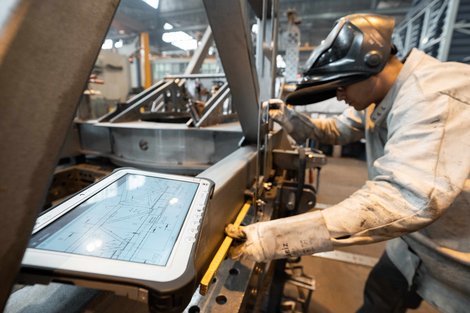Developed in Saxony-Anhalt: intelligent mobility spaces and autonomous cargo bikes

With an efficient infrastructure, Saxony-Anhalt is today not just an important logistics location in central Europe. For decades, a unique research landscape has also influenced the applied technical logistics, advancing its digitalisation. Future projects such as autonomous cargo bikes and the generation of intelligent mobility spaces from Saxony-Anhalt are unique in Europe.
“Digitalisation represents one of the few opportunities to loosen the Gordian knot resulting from two opposing challenges for logistics,” says Professor Fabian Behrendt from the Fraunhofer Institute for Factory Operation and Automation (IFF) in Magdeburg. On the one hand, he says, logistics has to meet the rising requirements of climate protection with environmentally friendly processes. On the other hand, however, logistics also has to organise the increasingly complex, globe-spanning value creation networks. “And that in times with increasing political uncertainties, ever scarcer capacities in infrastructure and rising volumes of goods as well as ever higher standards of safety, reliability and quality in supply and process organisation,” says Professor Behrendt. The scientist is researching the digitalisation of production and logistics systems in the context of Industry 4.0. However, he adds that digitalisation itself is also a huge challenge for many logistics companies, but also companies and public organisations. “In future, employees must be prepared for new working worlds, investments in digital technologies and processes must be increased and intelligent mobility and logistics spaces must be designed.”
Precisely this is being worked on in Saxony-Anhalt. The research location of Magdeburg has developed a profile above all in two topic areas closely connected to classic logistics - in the digitalisation of the factory and in the area of intelligent mobility spaces. The Fraunhofer IFF, for instance, is pursuing the goal of making production facilities and plant construction fit for Industry 4.0 with a holistic approach using robotics, measuring and testing technology, virtual engineering, factory planning, as well as material flow and identification technology.
Connecting traffic and energy networks with logistics
“With the intelligent mobility spaces as a research network at Otto von Guericke University, the traffic system is to be digitalised, and this is to be linked with energy supply and logistics. The former is the basis for environmentally friendly electromobility, the latter for the sustainable and low-congestion movement of goods and people, which, especially in cities, is reaching its limit,” says Professor Fabian Behrendt. The Fraunhofer IFF has collaborated with renowned industrial partners to develop new approaches to so-called integrated energy: the connection of energy networks and traffic networks. “Both infrastructures are now already heavily burdened; increasingly fleeting renewable energies and electric vehicles demand new expansion and strategic control requirements, for which implementable solutions are being sought,” says Behrendt.
The Otto von Guericke University Magdeburg is currently studying this in the partner project “InKoLa - Infrastructure coupling - placement and operation of charging stations from a traffic and energy network perspective”. Here, an interdisciplinary team from the fields of logistics and network technology is developing a strategy to implement and operate charging infrastructure in the town of Burg, Saxony-Anhalt. The objective is to install charging columns at ideal locations in the municipality that are connected to each other and equipped with a reservation system for the user.
“Transformer” researches the autonomous cargo bike
The Fraunhofer IFF is also involved in the research projects of Otto von Guericke University Magdeburg on the autonomous cargo bike. The interdisciplinary team “Transformers” from the fields of information technology, logistics, mechanical engineering and environmental psychology wants to transport bike-sharing systems into the next generation. With an autonomous call service, it allows real door-to-door mobility, complete integration into multi-modal travel chains and new combination variants of freight transport and passenger journeys. “The charming thing about the use of cargo bikes is that they can use less used cycle routes and, thanks to considerably lower surface area and energy consumption, can significantly relieve the burden on the environment as well as cities,” says scientist Fabian Behrendt. The research projects on the autonomous cargo bike and the generation of intelligent mobility spaces in Saxony-Anhalt are unique in Europe, he says.
Text: Michael Falgowski
more information
